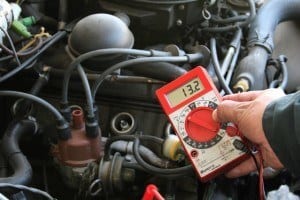 An engine requires a certain amount of pressure to run correctly. Mechanics can test your engine for proper compression not only to ensure that it is running optimally, but also to diagnose other problems, such as a bad exhaust valve, failing head gasket, or even the need for an entire overhaul.
An engine requires a certain amount of pressure to run correctly. Mechanics can test your engine for proper compression not only to ensure that it is running optimally, but also to diagnose other problems, such as a bad exhaust valve, failing head gasket, or even the need for an entire overhaul.
Mechanics have two ways to test engine compression: the manual way, with a compression gauge, or the electronic way, with an engine analyzer. When using a compression gauge, the engine is set up appropriately and the throttle held wide open while the pressure within a cylinder is measured. Each cylinder is tested in this manner, and the results are reviewed and compared to one another.
This manual method is, of course, much more difficult and involved than the electronic method. In the electronic method, mechanics use an engine analyzer to record compression measurements upon the engine start-up. This way requires no disassembling of the engine and can be relatively quickly done, with readable results ready to be printed out and reviewed.
Pressure problems can be helpful to mechanics in diagnosing specific problems; for example, a failed exhaust valve can be indicated by low compression within a single cylinder. Two adjacent cylinders with low pressure may indicate a problem with the head gasket, and a low reading in every cylinder usually calls for an engine overhaul.



